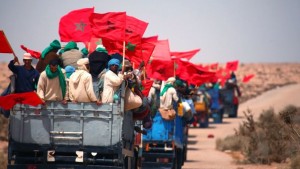Hollywood Reporter
by John DeFore
An entertainingly light, heavily slanted historical drama.
350,000 marchers assert Morocco’s ownership of the Western Sahara.
Buy a guidebook to Morocco, and you’ll see the southern chunk of the country’s map shaded as a separate entity, labeled “Western Sahara”: Conflicts over the region, you’ll be told, date back to Francisco Franco’s 1970s colonial land grabs and beyond.
Locals of the opinion that this conflict ended in 1975 and that Western Sahara is correctly called simply “more Morocco” have a champion in Youssef Britel’s La Marche Verte, a patriotic account of 350,000 civilians’ dramatic 1975 march into the territory. Inventing an ensemble of diverse characters, Britel gives them one thing in common: a deep, uncomplicated love of their king and country.
An enjoyably told if unsophisticated historical drama, it could win fans at international fests with the addition of some explanatory titles at the outset. Audience reaction here — viewers applauded as frequently as friendly lawmakers at a U.S. State of the Union address — suggests it’s a guaranteed hit on its own turf.
In 2015 Rabat, we watch a young journalist go to interview the elderly Ali, a key player in 1975’s Green March. Asking him if it’s true he is one of the protesters depicted on the back of the 100 Dirham bank note, she hands him the bill. As he looks at his younger self, a computer-generated white dove flies off the paper, carrying him and us back to those fateful days.
The younger Ali (charismatically played by Mourad Zaoui) is a likeable hustler on the run from a trio of men he has somehow wronged. Apolitical, he is opportunistically finding ways to evade the men when he winds up driving an ambulance on the march others have joined with zeal: In the movie’s extremely (and problematically) simplified telling, King Hassan II has called for a mass of civilians to cross the country from north to south, east to west, asserting independence from Spanish occupiers. 350,000 signed up.
We meet a pair of farmers from the provinces; an elderly, illiterate artist; and a pregnant woman who sneaks into the caravan intent on giving birth in the Sahara. Foreigners march to show their support, as well: reporters interview a man from Gabon; we spot an American flag or two in the sea of people; and there’s even a young Spanish woman, an anti-Franco nurse whose presence may puzzle fellow marchers but perfectly fits the movie’s big-tent inclusionary attitude. (The movie makes a point of Hassan II’s insistence that 10 percent of the marchers should be women “equal in duty, love, and rights” to the men. Why only 10 percent? And where will the King be while they’re out in the desert? Ask another storyteller.)
Britel’s screenplay offers plenty of little dramas to keep viewers engaged, stoking our investment in the march’s mission. (He also contributes to the sense of heady historical moment with a rather over-busy moving camera.) But in his focus on citizens idealistically pursuing “a Morocco with dialects and diversity,” Britel ignores the fact that some of those diverse peoples would prefer to govern themselves. The Green March of November 1975, after all, was not just a triumphant gesture of defiance against Spain. It kicked off a years-long clash with the Polisario Front, composed of Sahara natives who reject not just the rule of Spain and Mauritania, but of Morocco as well.
Production company: Entourage Production
Cast: Mourad Zaoui, Mohamed Khouyi, Mohamed Choubi, Saadia Azgoune, Nadia Niyazi, Rachid El Ouali, Driss Roukh, Ghalia Benzaouia
Director: Youssef Britel
Screenwriters: Youssef Britel, David Villemin
Producers: Othmane Benzakour, Mehdi Belhaj, Youssef Britel
Director of photography: Luca Coassin
Editor: Virginie Seguin
Composer: Mohamed Oussama
Venue: Marrakech International Film Festival (Out of Competition)
Sales: Entourage Production
In French, Arabic and Spanish
Not rated, 90 minutes








